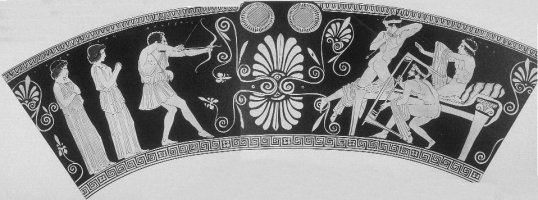


THE ODYSSEY

Books 20-24
Homework: Starting in the first chapter of The Odyssey, there has been an ongoing discussion of whether the Gods are responsible for the fate of the humans they watch so intently or whether the free choice of human beings determines their fate, which is then simply administered by the Gods according to an established moral system. In a one-page, single-spaced word-processed analysis, take a position on this issue, using one of the poem's main characters (Odysseus, Penelope, Telemachus) to illustrate and support your contention.
1) There are several omens in Book 20. Look at them carefully, and compare them to each other and to earlier omens.
2) What is the purpose of introducing Philoetius into the story?
3) How does Athene make the suitors behave? Why? Note the escalation in their mistreatment of the disguised Odysseus. What is Telemachus' response?
4) Throughout this section, Telemachus acts increasingly like a man and like his father. What evidence can you find to support this assertion?
5) The conclusion of Chapter 20 again takes up the question of whether gods or men are responsible for what happens to men. What conclusion does Homer reach? Where do you stand on this issue?
6) What are the responses to Odysseus' desire to join the competition on the part of the suitors, Penelope and Telemachus?
7) How does Odysseus reveal
himself? 
8) Why, according to Eurymachus, did Antinous lead the suitors in courting Penelope?
9) What choice does Odysseus give the suitors? Why?
10) What five characters help Odysseus in his revenge? What does each contribute? How is each one significant in terms of the story's meaning?
11) Besides the suitors, whom does Odysseus kill? Why? Who does he spare? Why?
12) After the massacre in the hall, who else is killed? For what reason?
13) Do you feel that justice was served in Ithaca that day? Why or why not?
14) How does Odysseus reveal himself to Penelope? Why does she have such a hard time believing her husband has really come home? What is Telemachus' response to her doubt? How does Odysseus feel about it? What does the entire episode tell you about Penelope and her life since Odysseus left her?
15) What plan does Odysseus make with Telemachus to keep the neighbors from taking immediate revenge on the family for killing "the best of Ithaca's young men, the mainstay of our state"?
16) Why introduce Agamemnon back into the action when the dead suitors reach the Underworld?
17) What rationale does Halitherses give the Ithican nobles for the justice of Odysseus' killing of their sons and brothers?
18) How does peace return to Ithaca?

Since you already have the questions and homework assignment for the final books of The Odyssey, I'll just suggest some links that might help you review for the test on Thursday--or that can take you further into the background and criticism of the text. Visiting these sites is, of course, optional.
If you'd like a summary of the main events of The Odyssey to help review for the quiz, here's a link to A Study Guide to Homer's Odyssey. The summary is preceded by background information, most of which you already have. It appears reasonably accurate, though caveat emptor is a good rule for any Web surfer. Enjoy.
Finally, for those who really want to explore the subject, I'm including a link to the Homer Home Page. It includes, among other things, a summary of the events of the Trojan War, the subject of The Iliad. See you in class.
And if you really have more energy and time than most, you might want to try The Odyssey Game, online from England, where they like to have fun with their classics. If you try it, let me know how it is.
Return to Daily Readings and Assignments Page
Return to Home Page